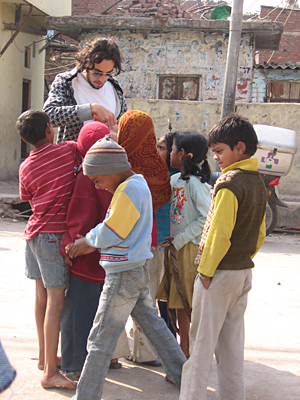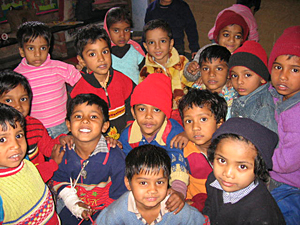- Rozovsky wins prestigious NSF Early Career Award
- UD students meet alumni, experience 'closing bell' at NYSE
- Newark Police seek assistance in identifying suspects in robbery
- Rivlin says bipartisan budget action, stronger budget rules key to reversing debt
- Stink bugs shouldn't pose problem until late summer
- Gao to honor Placido Domingo in Washington performance
- Adopt-A-Highway project keeps Lewes road clean
- WVUD's Radiothon fundraiser runs April 1-10
- W.D. Snodgrass Symposium to honor Pulitzer winner
- New guide helps cancer patients manage symptoms
- UD in the News, March 25, 2011
- For the Record, March 25, 2011
- Public opinion expert discusses world views of U.S. in Global Agenda series
- Congressional delegation, dean laud Center for Community Research and Service program
- Center for Political Communication sets symposium on politics, entertainment
- Students work to raise funds, awareness of domestic violence
- Equestrian team wins regional championship in Western riding
- Markell, Harker stress importance of agriculture to Delaware's economy
- Carol A. Ammon MBA Case Competition winners announced
- Prof presents blood-clotting studies at Gordon Research Conference
- Sexual Assault Awareness Month events, programs announced
- Stay connected with Sea Grant, CEOE e-newsletter
- A message to UD regarding the tragedy in Japan
- More News >>
- March 31-May 14: REP stages Neil Simon's 'The Good Doctor'
- April 2: Newark plans annual 'wine and dine'
- April 5: Expert perspective on U.S. health care
- April 5: Comedian Ace Guillen to visit Scrounge
- April 6, May 4: School of Nursing sponsors research lecture series
- April 6-May 4: Confucius Institute presents Chinese Film Series on Wednesdays
- April 6: IPCC's Pachauri to discuss sustainable development in DENIN Dialogue Series
- April 7: 'WVUDstock' radiothon concert announced
- April 8: English Language Institute presents 'Arts in Translation'
- April 9: Green and Healthy Living Expo planned at The Bob
- April 9: Center for Political Communication to host Onion editor
- April 10: Alumni Easter Egg-stravaganza planned
- April 11: CDS session to focus on visual assistive technologies
- April 12: T.J. Stiles to speak at UDLA annual dinner
- April 15, 16: Annual UD push lawnmower tune-up scheduled
- April 15, 16: Master Players series presents iMusic 4, China Magpie
- April 15, 16: Delaware Symphony, UD chorus to perform Mahler work
- April 18: Former NFL Coach Bill Cowher featured in UD Speaks
- April 21-24: Sesame Street Live brings Elmo and friends to The Bob
- April 30: Save the date for Ag Day 2011 at UD
- April 30: Symposium to consider 'Frontiers at the Chemistry-Biology Interface'
- April 30-May 1: Relay for Life set at Delaware Field House
- May 4: Delaware Membrane Protein Symposium announced
- May 5: Northwestern University's Leon Keer to deliver Kerr lecture
- May 7: Women's volleyball team to host second annual Spring Fling
- Through May 3: SPPA announces speakers for 10th annual lecture series
- Through May 4: Global Agenda sees U.S. through others' eyes; World Bank president to speak
- Through May 4: 'Research on Race, Ethnicity, Culture' topic of series
- Through May 9: Black American Studies announces lecture series
- Through May 11: 'Challenges in Jewish Culture' lecture series announced
- Through May 11: Area Studies research featured in speaker series
- Through June 5: 'Andy Warhol: Behind the Camera' on view in Old College Gallery
- Through July 15: 'Bodyscapes' on view at Mechanical Hall Gallery
- More What's Happening >>
- UD calendar >>
- Middle States evaluation team on campus April 5
- Phipps named HR Liaison of the Quarter
- Senior wins iPad for participating in assessment study
- April 19: Procurement Services schedules information sessions
- UD Bookstore announces spring break hours
- HealthyU Wellness Program encourages employees to 'Step into Spring'
- April 8-29: Faculty roundtable series considers student engagement
- GRE is changing; learn more at April 15 info session
- April 30: UD Evening with Blue Rocks set for employees
- Morris Library to be open 24/7 during final exams
- More Campus FYI >>
2:04 p.m., May 5, 2009----A group of University of Delaware undergraduates who went on a Study Abroad trip to India in January came back determined to do more for the people they had met and to forge long-term links between UD and a community 8,000 miles away.
After they returned to Delaware, four of the students -- Nicki Brooks, Lauren House, Ned Redmond, and Patrick Rogers -- submitted a proposal to UD's Office of Service Learning to establish a global academic partnership between UD and Katha, a non-governmental organization (NGO) that runs 72 schools in slum communities in India.
In the near term, the student team plans to start an e-mail friendship between UD and Katha students to help the children practice their English skills and the college students to help establish connections. Another immediate goal is to collect books, software, and other materials to send to Katha schools.
Next January, they plan to travel to India to work directly on Katha projects, assess the organization's needs, participate in a one-day conference to exchange ideas, and gather materials for a publicity video.
“When we first got to Delhi, we were struck by the extreme poverty we encountered,” says House, a junior majoring in mass communications and political science. “Although we wanted to help, we quickly realized that giving the children money wouldn't do any good because most of them work under beggar masters. And giving them candy and other food wouldn't help them live a better life.”
Just as Katha has been a pivotal force in bettering the lives of women and children in India, it is providing the answer to the American students' desire to help. Started in 1990 as a mobile library, the organization has developed an education model built on the idea that children can help their communities get out of poverty by effecting change that is sustainable and real. Katha's aim is to “transform every child into a community leader through relevant education.”
The UD students came into contact with Katha because the faculty member in charge of the Study Abroad trip, Mahasveta Barua in the Department of English, had decided to use the organization's translations of women writing in regional languages for the Women Writers course (ENGL380) that was part of the Winter Session program.
“I knew of Katha's reputation and great success educating children in need,” she says, “and we were welcomed warmly on our first visit. I think that first visit caught my students' imaginations -- seeing the children's illustration through the building and hearing of their storytelling methods -- and I remember being pleasantly surprised when many of them thanked me for taking them there after we got back on the bus.”
“The school was absolutely amazing,” says Brooks, a sophomore majoring in international relations. “The hallways are just an explosion of color with paintings and murals done by the children. The kids are really engaged; they brainstorm and collaborate on projects, such as writing and illustrating their own books and learning how to use PowerPoint to produce presentations on issues of interest to their community. It's hard to believe that they can do so much with so little.”
The UD students' enthusiasm for what they saw in the Katha schools received some direction when Barua divided the 11 students who had gone on the Study Abroad trip into three groups and assigned them to produce a viable proposal for solving a problem they had seen in their travels. “This group was interested in volunteering for Katha anyway,” she says, “and writing the proposal helped clarify their ideas.”
Redmond, a sophomore majoring in English and art history, points out that while the project will enable him and his classmates to help the Katha students, the UD students have just as much to gain as they do to give.
“The organization needs volunteers for projects that can use the expertise of a wide range of majors,” he says, “from art, communications, linguistics, and English to urban affairs, political science, international relations, and women's studies. UD students can make a valuable contribution while gaining equally valuable experience.”
The students also hope to learn more about the efficacy of NGOs. “This is a great opportunity to see what types of organizations are effective in empowering women and helping children learn,” Brooks says. Her experience so far suggests that one of the reasons Katha is so effective is that the organization not only educates children but also empowers women. “Their motto is 'When women earn, children learn,'” she says.
Delhi may be ten time zones away from Delaware, but that means little in the 21st century. “The world is shrinking,” House says. “With technology, everything is closer today. Going to India changed my life and what I want out of it. This service learning project will enable students to learn what it means to contribute globally.”
“Visiting Katha made us see that we have the opportunity to be global citizens in a way that goes beyond traditional Study Abroad programs,” Brooks adds. “Our generation recognizes that it doesn't matter where you're from -- we all need to approach problems together.”
“I think one of the reasons for the UD students' enthusiasm,” Barua says, “is that they found a concrete way of being part of the solution, rather than just feeling compassion and then fundraising or donating money. The University wants its undergraduates to be engaged and involved -- locally and globally -- and what better way to be so than this? By contributing to such efforts, I believe these young students will emerge with very real connections to the world at large.”
Article by Diane Kukich




